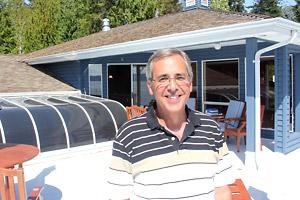Rural residents worried about a treatment facility proposed for their neighbourhood brought their concerns to the Powell River Regional District August planning committee meeting.
Dr. Jacques du Toit, a Powell River medical doctor, is proposing to run a residential program for women to help them overcome alcohol and drug addiction, compulsive gambling or other life challenges. Seaside Wellness Centre for Women will be housed in a six-bedroom home on Traffe Road, which currently is being renovated to add more bedrooms and improvements required by Vancouver Coastal Health (VCH), the licensing authority. Up to nine clients will live in the house during the 42-day program, as well as staff.
Neighbourhood residents who attended the planning committee meeting expressed a wide range of concerns, including the impact on water and sewage systems, additional traffic, parking and lighting, security, the safety of children, privacy and the potential negative effect on real estate values. In particular, residents spoke of a shortage of water in summer and how they notify each other when levels are low to reduce usage.
Du Toit is also the medical director for Sunshine Coast Health Centre, a drug rehabilitation centre for men on Highway 101 and Fleury Road. Many people in that area expressed the same concerns about the facility at the time it was proposed, he said. “As it turned out, there have been no problems in the area around that facility,” he said. “We’re proposing a much smaller facility and the development is low-key.” He has installed a pump-out septic system and water conservation measures have been built into the operations, du Toit explained.
Bill Crysler, the former chief executive officer of Powell River’s Community Health Council who has 30 years’ experience in management of health facilities and seniors’ retirement homes, is a consultant on the project. He said there would not be any security lights or signs and no excess parking was being created. He also said they would look at any options that would provide privacy for their neighbours.
While he couldn’t say real estate prices wouldn’t be affected, Crysler said “I’d like to think that if we do this right and if we don’t obstruct views, and have a quietly run, discrete operation, the values hopefully won’t change.”
No alcohol or drugs are allowed on the premises, Crysler said, and if clients have any, they are immediately sent home. As for the safety of children, he said, the program won’t accept anyone who has a history of violence. “I know most of us don’t want something like this in our neighbourhood,” he said. “I’m asking, please, give it a chance. Let us show you we can run it well.”
Patrick Brabazon, Electoral Area A director, pointed out most of the concerns lie outside of the regional district’s jurisdiction, including water and sewage, which will be handled by VCH. He noted that the official community plan (OCP) for the area designates the property as suburban residential and may be used for one family and an accessory home occupation. He agreed that the regional district can’t enforce the OCP because there is no zoning bylaw for the area. “I would strongly suggest to you that this is in contravention of the OCP and that’s not a good way to get started in the neighbourhood,” Brabazon said.
The proponents are holding an open house for neighbourhood residents so they can learn more about the facility and the plans to protect privacy and security.



